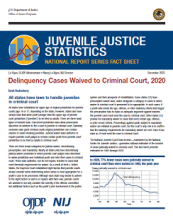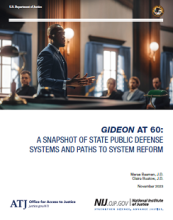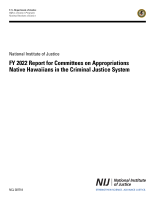Justice system
Recidivism in a Sample of Serious Adolescent Offenders
Bridging the Gap Between Prosecutors' Cases and Victims' Biographies in the Criminal Justice System Through Shared Emotions
Procedural Justice in Jails
Profiles of Risk for Self-injurious Thoughts and Behaviors Among System-Impacted Girls of Color
Delinquency Cases Waived to Criminal Court, 2020
The Recursive Relationship Between Substance Abuse, Prostitution, and Incarceration: Voices From a Long-Term Cohort of Women
Sentinel event reviews: Applications in criminal justice settings
Gideon at 60: A Snapshot of State Public Defense Systems and Paths to System Reform
NIJ Awards $16M to Support Forensic Science Research
On September 26, 2023, NIJ announced $16 million in new funding to support 33 projects under the FY23 Research and Development in Forensic Science for Criminal Justice Purposes solicitation. Through this program, NIJ continues to advance the speed, accuracy, and reliability of forensic analysis, which ultimately bolsters the administration of justice.
Funding Highlights for Fiscal Year 2023
Since 2009, NIJ has invested nearly $300 million...
FY 2022 Report for Committees on Appropriations Native Hawaiians in the Criminal Justice System
The role of hopelessness and procedural justice on depressogenic outcomes in serious adolescent offenders
"Examining the Effects of Back-End Release Discretion on Prison Populations and Length of Stay: A State-by-State Analysis"
911, What's Your Emergency?: Factors Impacting Call Coding
Cold Cases and Serial Killers, Part 1
In April 2018, the Golden State Killer, Joseph DeAngelo was arrested. NIJ support helped lead to his arrest, and in the aftermath of the arrest, NIJ Social Science Analyst Eric Martin was among those tasked with finding other cases NIJ helped law enforcement solve. Eric joins the show to talk about some of those cases, and answer some broader questions about serial killers: What is a serial killer? Are they on the rise? How do we know how many serial killers are currently active?






